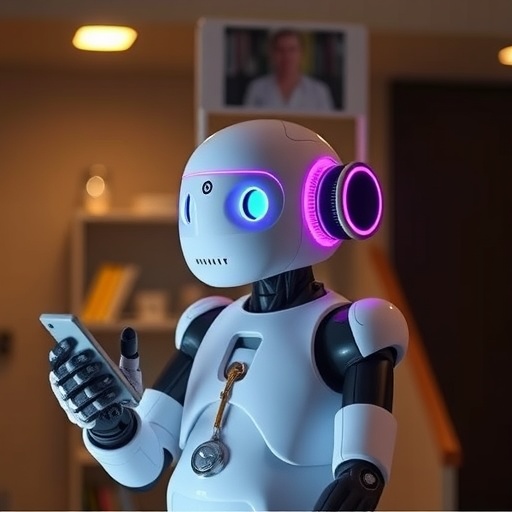In a groundbreaking study, researchers Shi, Li, and Ning have delved into the integration of generative artificial intelligence (AI) chatbots within an innovative educational framework aimed at enhancing the learning experience of undergraduate nursing students. This research, set to be published in the journal BMC Medical Education in 2025, explores the efficacy of combining project task-driven teaching methodologies with the capabilities of AI chatbots. As the healthcare landscape continues to evolve, the training of future nurses needs to adapt to prepare them for the increasingly complex demands of the profession.
The impetus behind this study is the recognition of the growing need for effective educational strategies that foster critical thinking, problem-solving skills, and practical knowledge among nursing students. Traditional educational approaches often fall short in preparing students for real-world challenges, leading educators to seek alternative methods. By leveraging the power of generative AI chatbots, this research aims to create a more dynamic and interactive learning environment that closely simulates real patient interactions.
Generative AI chatbots have shown great promise in various domains, but their application within nursing education represents an exciting frontier. These intelligent systems can engage students in meaningful dialogues, simulate clinical scenarios, and provide personalized feedback. This quasi-experimental study aims to evaluate the impact of using AI chatbots on nursing students’ learning outcomes, engagement levels, and overall preparedness for clinical practice.
The research methodology involves a comparative analysis between two groups of undergraduate nursing students: one that utilizes traditional teaching methods and another that incorporates generative AI chatbots alongside project-based tasks. By employing robust statistical analyses, the researchers will assess the differences in performance, engagement, and satisfaction levels between the two cohorts. This rigorous approach ensures the findings are both reliable and credible, paving the way for potential curriculum adaptations across nursing schools.
In addition to evaluating academic performance, the study will delve into qualitative aspects of the learning experience. Surveys and interviews will be conducted to gather insights from the students regarding their perceptions of the AI chatbot’s utility, user-friendliness, and overall impact on their learning. Through these measures, Shi and colleagues hope to understand how AI technology can best complement traditional teaching methods and enhance the educational experience.
Furthermore, the implications of introducing generative AI chatbots into nursing education extend beyond mere academic achievement. The study posits that these tools could foster an environment conducive to collaborative learning, encouraging students to share knowledge and insights. The interactive nature of AI engagements may also help to reinforce theoretical concepts by providing students with immediate, practical examples, thus bridging the gap between classroom learning and real-world application.
Ethical considerations are paramount when discussing the integration of AI in any field, especially in healthcare education. The researchers acknowledge the importance of establishing guidelines to ensure that AI chatbots are used responsibly and effectively. By providing clear parameters for their application, the integration of these chatbots can be geared toward enriching the educational landscape while safeguarding students’ learning experiences.
As the findings of this study are anticipated to contribute significantly to the field of medical education, the potential for widespread adoption across various educational institutions could reshape how nursing programs operate. With increasing demands for innovative solutions in healthcare education, the implications of utilizing generative AI chatbots could resonate beyond nursing, influencing other areas of medical training as well.
The role of technology in education is accelerating, and generative AI chatbots represent just one dimension of this transformation. The successful implementation of this research could set a precedent for integrating AI broadly within academic curricula. Future studies may look into developing specialized chatbots tailored for different medical specialties, enhancing the learning experience even further.
As healthcare continues to adopt technological advancements, the training of future nursing professionals must evolve concurrently. This study by Shi, Li, and Ning not only proposes a novel approach but also encourages educators to envision a future where technology complements human teaching. By preparing students with both knowledge and practical skills, the role of nurses in the healthcare system can be adequately reinforced.
In conclusion, the emerging evidence from this quasi-experimental study heralds a new chapter in nursing education, where generative AI chatbots provide innovative solutions for enhancing student engagement and learning outcomes. The synergy between technology and education could reshape the way healthcare professionals are trained, ultimately benefitting not just students, but also the patients they will serve. As this research heads to publication, the broader academic community awaits its implications, ready to embrace the future of learning.
The potential of AI in medical education is vast, and the dynamics explored in this study could unlock new paradigms of teaching and learning in nursing. This study serves as a pivotal moment that could redefine educational strategies and enhance the overall quality of healthcare education, paving the way for a more competent and prepared nursing workforce.
In the rapidly evolving world of healthcare, the integration of generative AI technologies heralds a transformative era for nursing education. As educators and institutions strive to adapt to new paradigms, initiatives such as this one represent critical steps forward in optimizing educational methods to meet future demands.
Subject of Research: Integration of generative AI chatbots in nursing education.
Article Title: Application of generative artificial intelligence chatbots + project task driven teaching in undergraduate nursing students: a quasi-experimental study.
Article References:
Shi, J., Li, X., Ning, Y. et al. Application of generative artificial intelligence chatbots + project task driven teaching in undergraduate nursing students: a quasi-experimental study.
BMC Med Educ (2025). https://doi.org/10.1186/s12909-025-08324-y
Image Credits: AI Generated
DOI:
Keywords: Generative AI, nursing education, chatbots, project-based learning, medical training, educational innovation.




